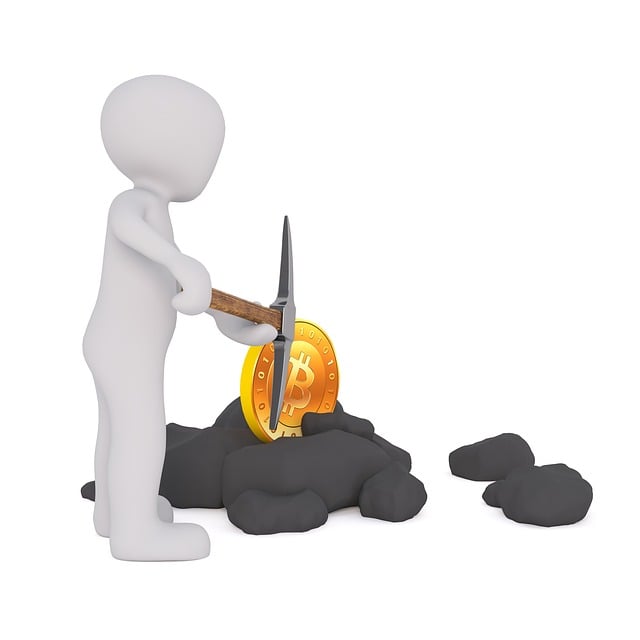Crypto Risks: Ensuring Secure Digital Currency Storage
Author: Jameson Richman Expert
Published On: 2023-11-15
Prepared by Jameson Richman and our team of experts with over a decade of experience in cryptocurrency and digital asset analysis. Learn more about us.
Cryptocurrency has become an increasingly popular investment option, but with it comes certain risks. One of the most important aspects of crypto investing is ensuring the secure storage of digital currencies. Without proper security measures, investors can lose their funds to hackers or other forms of cyberattacks. In this article, we will explore the risks associated with crypto storage and provide tips on how to protect your digital assets.

The Importance of Secure Digital Currency Storage
With the rise of cryptocurrencies, the need for secure storage options has become paramount. Unlike traditional banks, digital currencies are decentralized and do not have a physical form. This makes them vulnerable to theft or loss if not properly protected. It is crucial for investors to secure their digital assets to prevent unauthorized access and potential financial losses.
Crypto Risks and Vulnerabilities
There are several risks and vulnerabilities associated with digital currency storage. One common risk is the threat of hacking. Cybercriminals are constantly devising new ways to exploit vulnerabilities in crypto wallets or exchanges and steal funds. Additionally, there is always the possibility of losing access to a wallet or forgetting the password, resulting in permanent loss of funds. Furthermore, investors may also fall victim to phishing scams or malware attacks that can compromise their private keys and allow attackers to gain control over their digital assets.
Protecting Your Digital Assets: Best Practices
To ensure the secure storage of your digital currency, it is essential to follow best practices. Firstly, it is crucial to choose a reputable and secure wallet or exchange for storing your crypto. Research different options and opt for those with robust security measures in place. Utilizing hardware wallets, which store private keys offline, is also recommended for enhanced security.
Another important practice is to enable two-factor authentication (2FA) whenever possible. 2FA adds an extra layer of security by requiring users to provide a second form of verification, such as a unique code sent to their mobile device, in addition to their password.
Regularly updating your software and keeping it patched is also critical in protecting your digital assets. Developers often release security updates to address any vulnerabilities or bugs that may exist. By staying up to date, you can minimize the risk of falling victim to known security issues.
It is also advisable to store backups of your wallet's private keys in multiple secure locations. This way, if you lose access to your primary wallet or it gets compromised, you can still recover your funds using the backup.
Crypto Risks: Ensuring Secure Digital Currency Storage (source: cryptotradesignals.live)
Crypto Mining Taxes 2021: Understanding the Tax Implications of Cryptocurrency Mining
Author: Jameson Richman Expert
Published On: 2023-11-15
Prepared by Jameson Richman and our team of experts with over a decade of experience in cryptocurrency and digital asset analysis. Learn more about us.
Cryptocurrency mining has gained significant popularity in recent years. As more individuals and businesses participate in mining, it is important to understand the tax implications associated with this activity. In this article, we will explore the tax considerations for crypto mining in 2021 and provide insights into managing your tax obligations.
What is Crypto Mining and How Does It Work?
Crypto mining involves using powerful computer systems to solve complex mathematical problems that validate and add transactions to the blockchain. Miners are rewarded with newly minted coins as an incentive for their computational work. However, mining also incurs certain costs and generates taxable events that need to be considered.
Taxable Events in Crypto Mining
There are several taxable events that occur during the mining process. One such event is the receipt of newly minted coins as a reward for mining. In most jurisdictions, these rewards are considered income and are subject to taxation. The value of the coins at the time of receipt will determine the taxable amount.
Additionally, when miners sell or exchange the mined coins for other cryptocurrencies or fiat currencies, they may incur capital gains or losses. The difference between the purchase price of the coins and their sale price will determine the taxable gain or loss. It is important to keep accurate records of all mining-related transactions to ensure proper reporting.
Managing Tax Obligations
To manage your tax obligations related to crypto mining, it is crucial to keep detailed records of all mining activities. This includes information such as the date and time of each mining operation, the coins mined, their value at the time of receipt, and any associated costs.
Consider utilizing dedicated accounting software or tools that are specifically designed for tracking crypto transactions. These tools can help automate the process and ensure accurate reporting for tax purposes.
Consulting with a tax professional who has experience in cryptocurrency taxation is highly recommended. They can provide tailored advice based on your specific circumstances and help you understand and comply with the tax regulations in your jurisdiction.
Crypto Mining Taxes 2021: Understanding the Tax Implications of Cryptocurrency Mining (source: cryptotradesignals.live)
Get Out of Crypto: Ensuring Secure Digital Currency Storage
Author: Jameson Richman Expert
Published On: 2023-11-15
Prepared by Jameson Richman and our team of experts with over a decade of experience in cryptocurrency and digital asset analysis. Learn more about us.
While investing in cryptocurrencies can present lucrative opportunities, it is essential to prioritize the secure storage of your digital assets. With cyberattacks and hacking attempts on the rise, taking steps to safeguard your crypto holdings is crucial. This article explores the importance of secure digital currency storage and provides tips to help you protect your investments.
The Risks of Insecure Crypto Storage
Failure to secure your digital currency can result in significant financial losses. Hackers and cybercriminals target individuals and exchanges to gain unauthorized access to crypto wallets and steal funds. Without proper security measures in place, investors are at risk of losing their hard-earned digital assets.
Protecting Your Digital Currency Investments
Ensuring the security of your digital currency storage is of utmost importance. Here are some essential steps to protect your investments:
Secure Your Digital Assets Today
Investing in cryptocurrencies can be rewarding, but it is crucial to prioritize the security of your digital assets. By following best practices and implementing robust security measures, you can significantly reduce the risk of falling victim to cyberattacks and ensure the long-term safety of your investments.
Get Out of Crypto: Ensuring Secure Digital Currency Storage (source: cryptotradesignals.live)
NFT Crypto Stocks: A Revolutionary Asset Class in the Digital World
Author: Jameson Richman Expert
Published On: 2023-11-15
Prepared by Jameson Richman and our team of experts with over a decade of experience in cryptocurrency and digital asset analysis. Learn more about us.
Non-Fungible Tokens (NFTs) and crypto stocks are emerging as a revolutionary asset class in the digital world. With their unique properties and widespread adoption, they are transforming various industries and creating new investment opportunities. This article explores the concept of NFT crypto stocks and their potential impact on the financial landscape.

The Rise of NFTs
NFTs are cryptographic tokens that represent ownership or proof of authenticity of a unique digital asset. Unlike cryptocurrencies such as Bitcoin or Ethereum, which are fungible and can be exchanged on a one-to-one basis, NFTs are indivisible and cannot be traded or exchanged on a like-for-like basis.
How NFT Crypto Stocks Work
NFT crypto stocks combine the features of NFTs and traditional stocks. These tokens represent ownership in a company, similar to traditional stocks, but with the added benefits of NFT technology. Holders of NFT crypto stocks have the ability to trade, sell, or transfer their ownership digitally.
As digital assets, NFT crypto stocks offer the advantages of blockchain technology, including transparency, immutability, and decentralization. They allow investors to participate in the growth of a company and potentially earn dividends or other benefits associated with traditional stocks.
Potential Benefits and Risks
The emergence of NFT crypto stocks introduces several potential benefits. They provide liquidity and ease of trading, allowing investors to buy and sell shares without intermediaries. Additionally, NFT technology enables fractional ownership, making it easier for individuals with limited funds to invest in high-value assets.
However, like any investment, NFT crypto stocks come with risks. The volatility of the cryptocurrency market can impact their value, and the lack of regulations may expose investors to potential scams or fraudulent activities. It is crucial to conduct thorough research and due diligence before investing in any NFT crypto stock.
NFT Crypto Stocks: A Revolutionary Asset Class in the Digital World (source: cryptotradesignals.live)
Justin Sun's Influence in the Crypto Industry
Author: Jameson Richman Expert
Published On: 2023-11-15
Prepared by Jameson Richman and our team of experts with over a decade of experience in cryptocurrency and digital asset analysis. Learn more about us.
Justin Sun, the founder of TRON and CEO of BitTorrent, has made a significant impact on the crypto industry. Known for his entrepreneurial spirit and marketing prowess, Sun has become a prominent figure in the blockchain and cryptocurrency space. This article explores Justin Sun's influence and his contributions to the crypto industry.
The Rise of Justin Sun
Justin Sun burst onto the scene in 2017 when he launched the TRON blockchain platform and its native cryptocurrency, TRX. Since then, he has gained recognition for his aggressive marketing strategies and high-profile acquisitions, including the popular peer-to-peer file-sharing platform BitTorrent.
Contributions to the Crypto Industry
Justin Sun's leadership and entrepreneurial vision have played a significant role in the crypto industry. Through TRON, he aims to create a decentralized platform for content creators, empowering them to bypass traditional intermediaries and retain control over their work.
Sun's acquisition of BitTorrent further strengthened his influence in the industry. By combining the power of blockchain technology with BitTorrent's massive user base, he aims to revolutionize the entertainment industry and create a decentralized content sharing ecosystem.
Controversies and Criticisms
Despite his successes, Justin Sun has also faced controversies and criticisms. Some skeptics question the viability of TRON's technology and its ability to deliver on its promises. Sun's aggressive marketing tactics have also drawn criticism, with some accusing him of overhyping events and making unrealistic claims.
Additionally, Sun's high-profile lunch with Warren Buffett garnered both praise and criticism. While the lunch aimed to bridge the gap between the traditional financial world and the crypto industry, some regarded it as a publicity stunt.